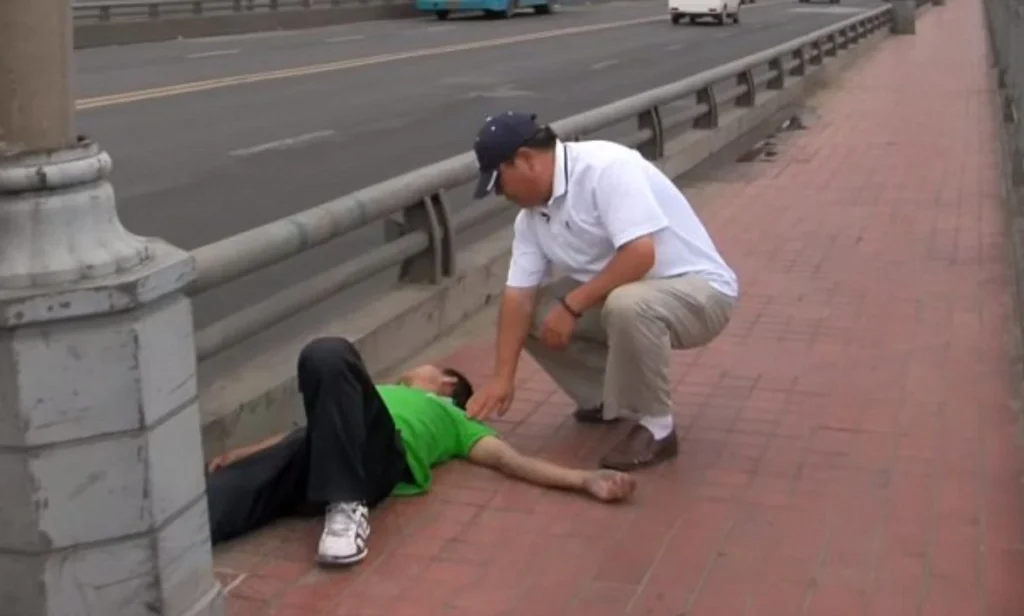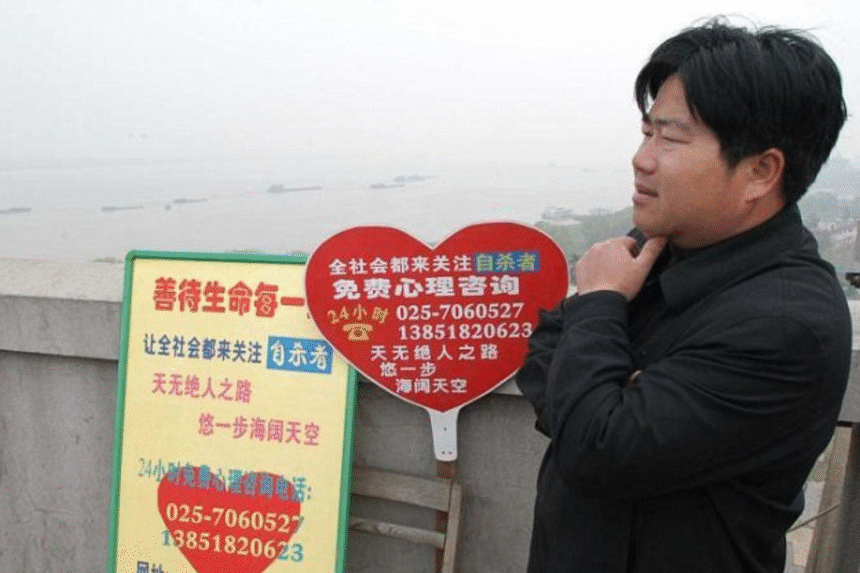On most weekends, when the morning fog hangs over the Nanjing Yangtze River Bridge, you can find Chen Si leaning against the railing, scanning the crowd. He isn’t sightseeing. He’s looking for the quiet signs of despair—a slumped shoulder, a blank stare, slow and heavy steps.
For more than twenty years, this man has made it his mission to save strangers from ending their lives on one of China’s most infamous suicide hotspots.
Chen Si, born in 1968 in Suqian, Jiangsu Province, didn’t grow up expecting to become a hero. His childhood was marked by poverty and he left high school early to work.
In the 1990s, he moved to Nanjing and opened a small fruit stand. It was humble work but he slowly built a life. Even then, Chen had a soft spot for people who were struggling, maybe because he understood hardship himself.
The First Rescue

In 2000, Chen was crossing the bridge when he noticed a young woman standing by herself. She looked lost and worn out. Curious and concerned, he struck up a conversation.
The woman admitted she had no money and no place to go. Chen bought her food and water and even a train ticket home. He later said, “I realised that these people could be saved.” That day changed everything, the South China Morning Post reports.
From that moment on, Chen began spending his weekends on the bridge. By 2003, it became a routine: every Saturday and Sunday, he’d wake up early, hop on his motorbike and patrol the bridge for hours. He started wearing a red volunteer vest with the words “cherish life every day” printed in Chinese.
Chen developed an instinct for spotting people on the edge—literally. He once explained his method: “People with an extreme internal struggle don’t have relaxed body movements, their bodies look heavy.” This sharp eye has allowed him to step in before tragedy could strike.
Risk and Compassion

Intervening isn’t always simple. Chen has had to talk people down for hours, listening to their troubles and convincing them to take another chance at life. Other times, he’s physically pulled people back over the railing. Each story is different, but Chen tries to go beyond saving someone in the moment. He wants to help them keep living afterward.
One man named Shi Xiqing climbed the bridge because of crushing debt—$15,000 in medical bills for his daughter’s leukemia. Chen didn’t just save him; he called Shi’s creditors and begged them to ease the burden, as noted by Wikipedia.
In another case, he raised over 10,000 yuan (about US$1,400) to pay a girl’s college tuition when she couldn’t afford it.
There are dozens of stories like these. Once, a woman stood sobbing on the edge because of her husband’s affair. Chen wrapped her in a blanket and promised, “If the sky falls, I’ll be your big brother and hold it up for you.”
Chen has spent his own savings to rent hotel rooms for people who had nowhere to go, often covering their meals and travel expenses. His work is dangerous, exhausting and unpaid. Yet he keeps showing up.
A Symbol of Hope

Over the years, Chen has stopped at least 469 people from jumping, according to NPR’s Louisa Lim, who once described him as an “unlikely guardian angel.” He has become a symbol of hope for countless people who never even met him.
Social media users often share his story. One wrote, “I saw him on the news more than 20 years ago. I didn’t think he would still be saving lives.” Another called him exactly what many believe he is: “Giving those in despair hope and a chance to live, Chen is truly an angel.”
Chen’s life work eventually caught international attention. Filmmakers Jordan Horowitz and Frank Ferendo created the documentary Angel of Nanjing, which won over thirteen awards worldwide, per Financial Express.
The film shows him racing down the bridge on his motorbike, scanning for signs of despair and hugging strangers who just moments earlier were ready to die.
More Than a Bridge
Chen Si never planned to become famous but his work has become an example of what one determined person can do. He spends his weekends with a helmet strapped on, riding back and forth across a 3-mile bridge, hoping he won’t be too late.
In a country where suicide was once a taboo topic, his efforts have sparked conversations about mental health, community support and compassion.
There are no medals or big paychecks for what Chen does. Just a weathered man with kind eyes, a red vest and a stubborn belief that life is worth fighting for.




